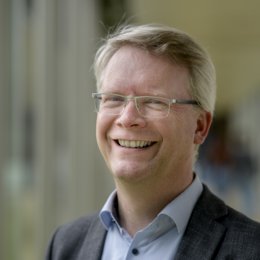To many people, quantum technology still seems like science fiction or what we will only encounter in the distant future. But in his inaugural lecture at the University of Twente, Pepijn Pinkse talks about quantum technology that already exists now and about future ones that threaten our encryption methods. This is why he argues to prepare ourselves now: "The best moment to get quantum security in place was three years ago. The second best moment is now."
A real or "universal" quantum computer threatens much of our modern cryptography. Payment transactions, encrypted internet and other forms of digital security are at risk. This quantum computer must operate with error correction to work well enough. This is not happening yet but the moment it will is getting closer. In three years, Twente spin-off Quix Quantum will deliver a prototype universal quantum computer to the German Centre for Aerospace. The Twente quantum computer runs on light and is already leading the way for such systems in Europe.
Existing quantum technology
Non-universal quantum computers made to perform certain, select, tasks already exist. "With 'Quantum Key Distribution', you exchange secret digital keys using already proven quantum technology," Pinkse says. Secret services are not necessarily fans he jokes: "Why exactly we physicists don't understand. Maybe because they can't build backdoors into it?" But the technology is already being sold commercially.
Another quantum technology that is already working is 'Quantum-Secure Authentication'. The technology behind it was developed in Twente by Pinkse and others. It uses a physical key that you cannot copy even if you possess all the information in that key. With just a few photons, it is possible to check the authenticity of the key. Unfortunately, the technology currently only works at a very short distance, but Pinkse may have a solution for that too. "Remote reading works as part of the research project of one of my PhD students: Daan de Ruiter," Pinkse says.
Quix Quantum
The Twente spin-off Quix Quantum is leading the way in the development of quantum photonic processors, according to Pinkse. He says: "The US-based PsiQuantum is working on its version of the optical quantum computer, but has not even attempted to sell anything yet. While the Twente company Quix - with much less investment - has already sold several quantum processors."
Quantum for Dummies
On 7 December, Pepijn Pinkse will give his inaugural lecture 'Light on Quantum Technology'. Before Pepijn's inaugural lecture, QUANT Centre, MESA+, QuantumDelta NL and MinacNed are jointly organising a symposium: Quantum for Dummies. Visitors will discover what exactly quantum is, how it works and how we apply it. The symposium is open to everyone. We will gradually build up the level throughout the day so that by the end you will be chatting along about wave functions, superpositions and entanglement.
More information
Prof Dr Pepijn Pinkse studied physics at Leiden University and obtained his PhD at the University of Amsterdam. After a short postdoc at the University of Konstanz, he spent ten years at the renowned Max-Planck Institute for Quantum Optics in the division of Gerhard Rempe. In 2009, he transferred to the University of Twente, where his research included pioneering work on quantum secure authentication. For his research, he received a Vici grant, the NWO's highest personal grant, in 2013. Since 2019, Pinkse has been professor of ‘Adaptive Quantum Optics’ (Faculty of S&T/ MESA+). He is also the director of the centre for QUAntum NanoTechnology Twente (QUANT).
On Thursday 7 December, he will deliver his inaugural lecture entitled: 'Light on Quantum Technology'. Registration to attend the oration is possible on the MESA+ website.






